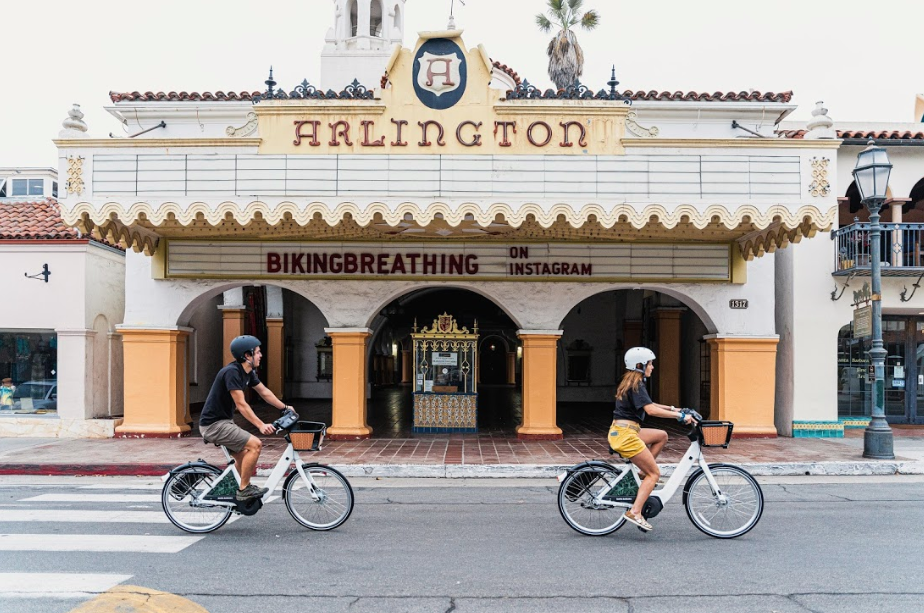BCycle Electric Bikes Roll Out This Thursday
Trek Launches Bike-Share Program in Downtown Santa Barbara Despite Weather, COVID

For more than 10 years now, the Trek Bicycle Corporation has wanted to launch a commercial bike-share program on the streets of Santa Barbara. This week, Trek — in the form of its subsidiary BCycle — is launching such a program with a fleet of all electric bikes under what could be about the worst conditions imaginable — with COVID raging and heavy rains predicted. Still, it’s a start for what could eventually become one of the premier electric-bike-share operations in the country.

Beginning about 7 a.m. Thursday, around 75 white electric bikes will be distributed throughout Santa Barbara’s downtown in the black docking stations installed late last year. The bikes, made for entry-level riders, weigh 58 pounds, can hit maximum speeds of 17 miles per hour with no pedal assist, and are good for 30-mile trips. Annual members cost $150. For nonmembers, a half-hour rental costs $7.
“Santa Barbara is such a huge cycling community, with downtown, City College, and UCSB,” said Jesse Rosenberg, the PR and operations chief imported to Santa Barbara by BCycle to launch the new program. Santa Barbara, she noted, has ranked high in top cities for cycling many years in a row. “People here are so oriented to the outdoors, and most destinations in Santa Barbara are less than 30 minutes away,” she added.
Get the top stories in your inbox by signing up for our daily newsletter, Indy Today.
It doesn’t hurt that Trek CEO John Burke is a part-time Santa Barbara resident. Burke is reportedly intent on making Santa Barbara’s system a showcase for how seamlessly an all-electric bike-share fleet can provide a meaningful alternative to cars for tourists and commuters alike.

In media interviews, Burke has described global warming as the most urgent challenge confronting the planet. “If you think COVID-19 is bad, climate change will be 100 times worse,” he said in an interview with the Capital Times in Madison, Wisconsin, where he lives most of the year. Of the 37 cities in which BCycle operates bike-share programs, Madison — not coincidentally — is the only other that’s gone all-electric.
Ultimately, the plan is to unload 250 electric bikes — and 500 docking stations — on city streets throughout downtown and the waterfront. For now, though, the opening has been forced by circumstances and politics to scale back to about half that number.
Come rain or shine, there will be no grand opening, ribbon-cutting ceremony, or balloons this Thursday. This is certainly not what Rosenberg envisioned when she moved out here this past May, when the company initially had hoped to launch.
In March, COVID “happened” and everything changed. State Street was closed off to traffic and turned into a pedestrian mall. The role of all bikes — and certainly electric bikes — in this new reality suddenly became subject for heated debate.
Then the city’s Historic Landmarks Committee (HLC) jumped in, objecting first to the color of the bike-share docks and then to whether public city streets should be yielded to a private company. City transportation planners — enthusiastically in support of the Trek program — insisted the HLC had no purview over such matters. Given that the bike-share program is part of a three-year trial run, they persuaded the council, the program could proceed.
Now confronting BCycle is City Hall watchdog Anna Marie Gott, who contends the Planning Commission essentially granted the bike-share program “a blank check” to locate its docking stations and kiosks along the waterfront based upon the market needs of the program. She argued the program could inflict visual damage to waterfront views and pose a safety hazard in such a congested part of town. The council almost never overturns its Planning Commission, so it’s considered unlikely in the extreme that Gott’s appeal will prevail.
Still, it adds an element of uncertainty. The waterfront is considered an essential element of the bike-share program, both financially and functionally. The hope and promise of the program were always that it could connect downtown, the Funk Zone, and the waterfront without cars or parking. Downtown landlord Jim Knell of SIMA Management has sung the electric bike’s praise as a vehicle by which Santa Barbara’s ailing downtown might experience some financial rejuvenation. For BCycle, more immediately, the waterfront offers a wealth of customers without whom the project will not pencil out.
Whatever happens this Thursday, Rosenberg said people will see the bikes being put out on the street. Whether it’s raining or not, she said, they’ll know they’re available.
CORRECTION: Jack Callahan was misidentified in the photo caption of an earlier version of this story.
Every day, the staff of the Santa Barbara Independent works hard to sort out truth from rumor and keep you informed of what’s happening across the entire Santa Barbara community. Now there’s a way to directly enable these efforts. Support the Independent by making a direct contribution or with a subscription to Indy+.




You must be logged in to post a comment.